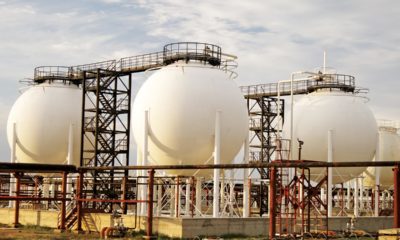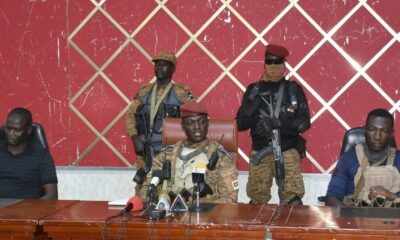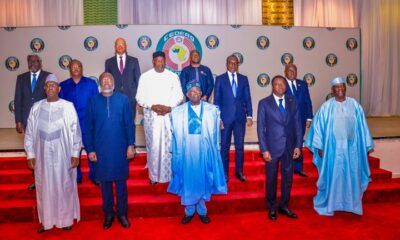Plans by military-ruled Mali, Niger and Burkina Faso to break away from a West African bloc have the potential to backfire on their already fragile economies and exacerbate widespread food insecurity.
The trio of nations are all landlocked and among the poorest in the region, with annual per-capita gross domestic product of less than $1,000.
Exiting the Economic Community of West African States places them at risk of losing access to a $702 billion market, and exposes them to increased tariffs and restrictions on the movement of goods and financial flows.
“The military coup leaders who control Burkina Faso, Mali and Niger have managed to score the silliest own goal since the UK voted for Brexit,” Charlie Robertson, head of macro-strategy at FIM Partners, said in an emailed note. “They take out 8% of Ecowas’ GDP and lose access to markets like Nigeria and Ghana, which together have a GDP of $467 billion.”
Ecowas members benefit from the free movement of goods, capital and people within the bloc. While trade between its 15 members is dominated by Ivory Coast, Ghana and Nigeria, and remains relatively small at about $277 million — or about 15% of the total they conduct — it has the potential to grow to as much as $2 billion over the next few years, the International Trade Centre said last year.
Sub-Saharan Africa has seen nine successful military coups since 2020, and Ecowas has been pushing for a return to civilian rule among those within its ranks. It suspended Niger, Mali and Burkina Faso and imposed far-reaching economic and diplomatic sanctions on them, but the latter two nations have since been readmitted to the bloc and relations had been regularized.
Nigeria, which holds Ecowas’ rotating chairmanship and generates more than half its GDP, said it deplored the juntas’ actions, which amounted to “public posturing” and would deny their populations the right to free movement and trade, according to a statement from the Ministry of Foreign Affairs.
Mali’s Foreign Minister Abdoulaye Diop defended the decision to leave Ecowas, saying it posed a threat to his nation and that its push for elections to be held was hurting its people.
“This decision was in our best interest in order to protect our interests and work with friendly countries,” he told public broadcaster ORTM on Monday. “We’re not alone, we have Niger and Burkina Faso.”
Credit Risks
Besides putting trade at risk, the three nations’ ability to access credit will also be impacted — they are all reliant on the regional market for financing because they can’t access international capital.
Mali and Niger defaulted on their domestic debt in 2021 and 2023 respectively after they lost access to the regional market. Burkina Faso has retained access, but if it is withdrawn its credit rating may be downgraded because of the increased risk of it being unable to refinance its commercial debt, S&P Global Ratings said in an emailed note.
“It’s a bit early to assess what the impact is going to be,” Pierre-Olivier Gourinchas, the International Monetary Fund’s chief economist, told reporters in Johannesburg on Tuesday. “In general, having an integrated economic area is something that’s going to be favorable, conducive to trade and conducive to higher growth. Moving away from this is going to have the opposite effect.”
The juntas haven’t indicated whether they intend leaving the West African Economic and Monetary Union, which seeks to promote financial integration in West Africa and regulates a regional central bank and the French-backed common West African franc that’s used by eight countries. Such a move would make it very difficult for commercial banks to continue operating.
Negotiated Solution
“The impact of exiting the WAEMU – which is not Moody’s baseline expectation – would have credit-negative implications for regional banks across the monetary union,” Mik Kabeya, a Moody’s Investors Service vice president and senior analyst, said in an emailed response to questions.
On Sunday, Ecowas said it was ready to find a negotiated solution to the “political impasse.” It hasn’t followed through on previous threats to reinstate elected leaders by force.
“Putting the threat of military intervention on the table without the desire to follow through, was a show of weakness, not strength,” Joachim MacEbong, a senior governance analyst at Stears Insights, said in an emailed response to questions. “It has probably emboldened the regimes to think they can negotiate.”
Mali and Burkina Faso are scheduled to hold elections this year, according to agreements they struck with Ecowas. Niger has complicated talks with the bloc, preventing its mediators who visited the capital, Niamey, last week from leaving the airport.
The juntas “want to stay in power,” Ibrahima Kane, Executive Director of Open Society Foundations Africa, said by phone from Dakar, Senegal’s capital. “Naturally they will try to get maximum from the bargain.”




 Forex3 weeks ago
Forex3 weeks ago


 Naira3 weeks ago
Naira3 weeks ago
 Billionaire Watch3 weeks ago
Billionaire Watch3 weeks ago






 Naira3 weeks ago
Naira3 weeks ago






 Naira2 weeks ago
Naira2 weeks ago




 Naira2 weeks ago
Naira2 weeks ago




 Naira4 weeks ago
Naira4 weeks ago






 Naira1 week ago
Naira1 week ago

















